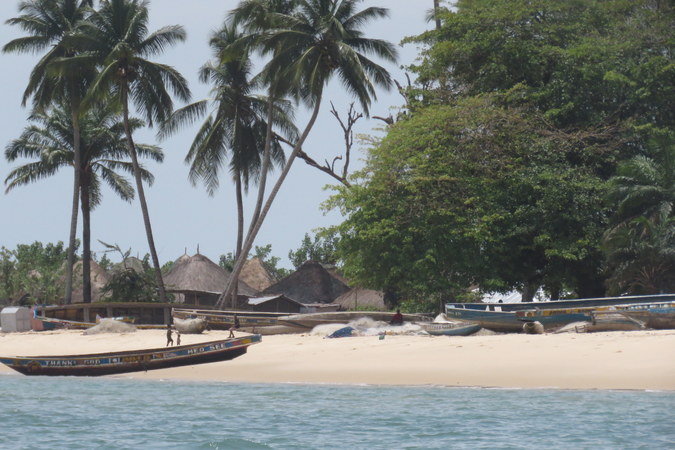
Written, and photographs, by Ian Packham
My skipper Moses has had his line tucked beneath his big toe, the nail as deeply ridged as the bark on a British oak, and streaming out behind our canoe for more than three hours without a bite. It means our dinner is looking limited in scope to the packs of pasta and couscous tucked neatly beneath the simple bench I’m sitting on. Given I’ve seen him haul out coota – the Krio word for barracuda – stretching to half his height on choppier days than this one with the same simple hand line, it comes as something of a surprise to the both of us.
A lifelong islander, Moses, like many Sierra Leoneans, appears more comfortable on the slatted orange planks of the large hand-crafted pirogue than on the terra firma of the continent. In small forest-fringed villages such as York, Sussex and Kent, reminders of British colonial rule over this portion of the West African coast, let alone the centre of the bustling capital of Freetown, you’re never far from the buzz or beep of a smartphone demanding immediate attention.
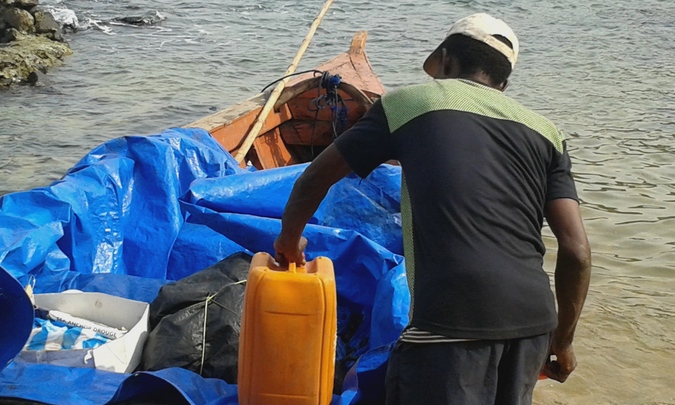
Escaping the rat race
Even in Sierra Leone, to escape the demands of our modern technologically-driven world you have to say goodbye to solid ground all together, and journey to what is often regarded as the remotest community in the region. There is no better tropical hideaway than the paradisaical Turtle Islands, and nowhere more isolated. There is no cold beer for god-knows how many miles, which is just as well given how far the nearest hospital is, or how long it would take to reach it.
But most importantly for someone who spends much of their life in front of a laptop and beside a phone, in constant contact with the outside world, reaching the islands means a complete digital detox, with no plug sockets, electricity of any sort, Wi-Fi connection or television news; miles from the nearest mobile phone signal and relay tower. There aren’t any sundowners unless you bring them, no spa but the warm lazy waters.
As a result, heading to the Turtle Islands is unlike any normal getaway and rather more like undertaking an expedition, with everything we might possibly need, from tents to spare engines, drinking water to toilet paper – and everything in between – loaded carefully into the nooks and crannies of the canoe in preparation for my departure.
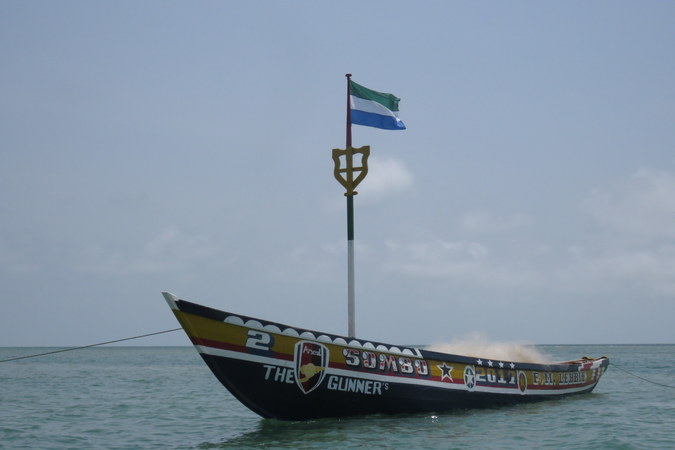
Alone at sea
Clambering inelegantly aboard, swinging my legs over her high sides, Moses settles down what is jokingly referred to as his ‘Nescafe’, a jar of frothy, largely alcohol-free, poyo palm wine, and starts up the 55 horsepower outboard motor with effortless expertise. The heavy canoe glides out from its natural beach landing to the deep blue yonder, and never has the phrase sounded so apt than now. It would be only a slight exaggeration to say that my life depends on the skills of a man I barely know; a thought that never crosses my mind on boarding an international flight.
With the pirogue’s hand-crafted bow pointed into the open ocean, so calm I can see the surface tension on the gentle swell, I realise for the first time the importance of Moses’ oft-mentioned compass. It is our only form of navigation save the sun. Without it, and without a mobile phone signal or satellite tracking, we could roam the Atlantic until our fuel and food ran out without finding either the islands or our way back towards Freetown. I slather on an extra layer of sunscreen.
The Turtle Islands lie, like a cartographer’s spilt biscuit crumbs, off the western tip of the much larger island of Shebro, roughly three-quarters of the way down Sierra Leone’s coastline. Approaching from Freetown across the yawning gap of Yawri Bay, there’s not another speck of land as Moses directs the boat with what turns out to be pinpoint accuracy and nothing but dead reckoning, his compass and years of experience plying these same waters in search of coota, grouper and snapper. We’re as alone as the butterfly we incongruously pass hours after our last sighting of Africa’s great bulk.
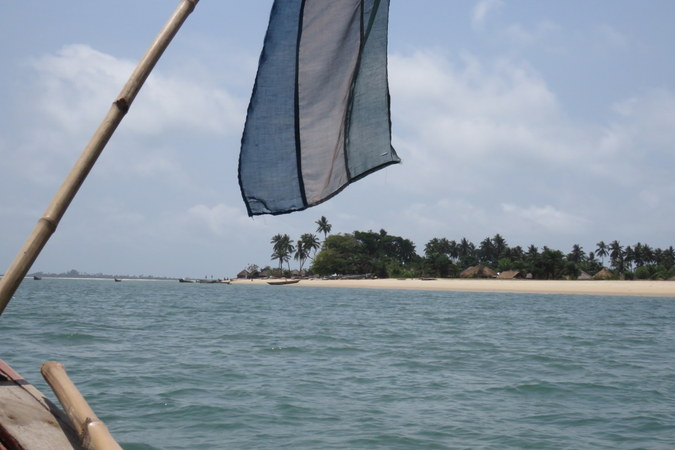
Holy island
‘Hoong!’ Moses eventually declares with satisfaction, taking another swig of his palm wine. With the rising heat haze I can hardly see anything of the smudge that has appeared on the horizon, and it takes us a full fifteen minutes more before my landlubber’s eye catches my first real sight of the island. Sacred, it is forbidden for anyone to set foot on Hoong except the initiated men of the local secret society. Women are not even allowed to gaze upon it, turning away or covering their heads with wax cloth wraps or towels especially brought for the purpose.
Without a single tug on his hand (or should that be foot) line, Moses cuts the engine, allowing us to drift beside a local boat of gently perspiring Turtle Islanders. As adept on the water as on dry land, their toes splayed, their balance unaffected by the motion of the bay, they bob in the waters where the shallows around the islands drop to oceanic depths. Yet the sea bottom is just a foot or so beneath the keel in places; we’re arriving at the lowest tide of the month, on the new moon. I’ve never understood the need for moon phase information in diaries until this point in my life.
We are eyed by a large hawk glissading effortlessly above us looking for a meal as much as Moses and myself. We barter three good-sized fish – our dinner finally sorted – cold from the luxury of their onboard ice-box for a single precious 1.5-litre bottle of far-from-cool mineral water.
Moses skilfully manoeuvres our pirogue around the shallows at the lowest possible speed to prevent our stranding. To me, it seems beyond impossible without the technological help of a well-calibrated radar system or depth gauge, but Moses knows these waters. Sometimes the growing sandbanks are signalled by unusually smooth patches of water, while at others they are denoted by fierce waves breaking as if on a beach. Before now yachts with far more impressive navigation systems on board than Moses and his compass have been caught-out and almost sunk.
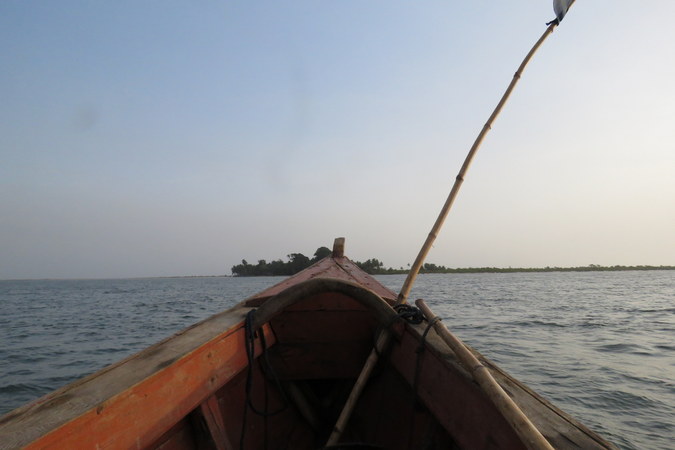
Making landfall
Beyond Hoong we approach the much larger and more welcoming Bumpetuk, the second of eight largely untouched islands that make up the group, then Chepo, Mut, Sei and Bakei, my day’s final destination. If I didn’t know better I would have thought Spike Milligan had come up with their names. I was promised cartoon versions of low desert islands rising out of pristine waters and comprising ‘two palm trees with a hammock strung between them’. I’m not disappointed.
On the beach at Bumpetuk a small village cluster around a hand-painted sign reading ‘Harbour fee 50,000 Le’. Surrounded all around by tall coconut palms, others lie fallen at the water’s edge, a reminder that these islands are slowly and constantly shifting sandbanks in the Atlantic shallows and nothing more.
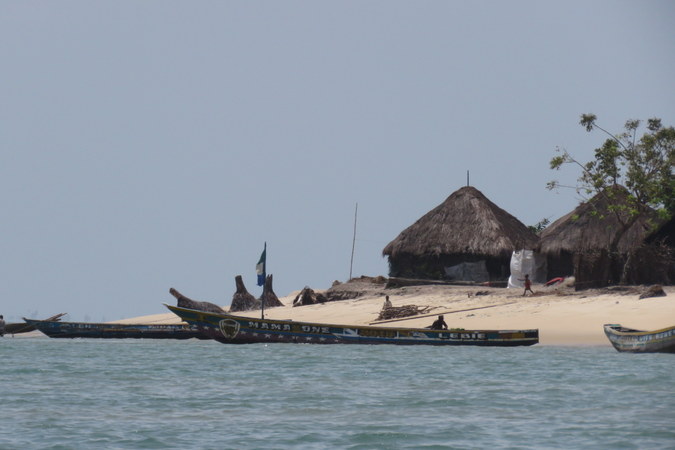
Our first landfall however isn’t the ‘harbour’ of Bumpetuk but the yellow sands on the edge of the protected horseshoe-shaped bay of Bakei, where we pick up Alpha, the local harbour master. It’s more a matter of etiquette than necessity, in a culture where respect for roles within the community are vital. “It is custom here to shake hands with the harbour master,” says Moses simply.
Alpha presents me with three coconuts, cut from the heights of the palms, still green and meant for drinking the deliciously-refreshing water within than eating the thin lining of flesh, adding a digestif of sorts to my growing meal. He guides us the short distance across the mouth of the horseshoe lagoon to the basic palm-thronged shelter where we are to set up camp. The tide is now so low we all but abandon the boat in the mud, laying the anchor uselessly beside it in anticipation of the incoming tide.
Island idyll
The sandy loams that make up Bakei are adorned with low scrubby plants that look to be suffering from the intense heat reflecting back up from the water’s surface. There is none of the breeze of Yawri Bay, and it’s impossible to walk barefoot on the sand for the heat it emits as I explore the nearest end of the island. As I do so, Moses refloats the boat, raising the anchor on the hunt for that still-elusive catch. Crabs, larger than any I have ever seen, scuttle about the narrow width of sand between the shrubs and the waves, dispensing eggs with celebratory waves of their pincers to the coming of the new moon. Turtle tracks run up another beach to the high tide line.
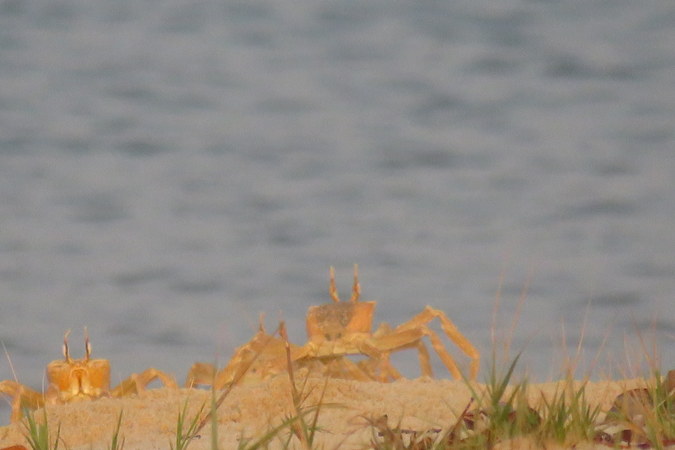
I don’t see another soul and have already forgotten about deadlines, those emails I didn’t quite have time to send, and thoughts of uploading jealousy-inducing images onto social media.
On the off-chance, I test for a phone signal – needless to say, there isn’t one. My mobile is a useless frippery from another, less boisterous but more expecting world.
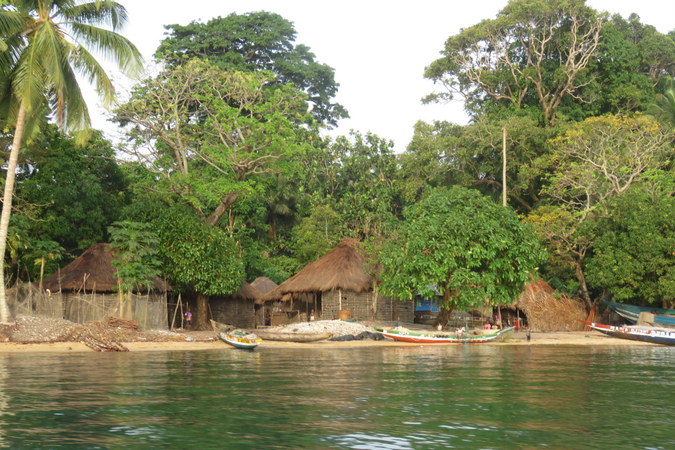
There is so little breeze that come nightfall I manage to keep an unprotected candle alight. The only other sources of light to be seen are the distant flashes of lightning, a dusting of stars more immediately above me, and the fleeting LED shine of Alpha’s torch from the opposite side of Bakei’s bay.
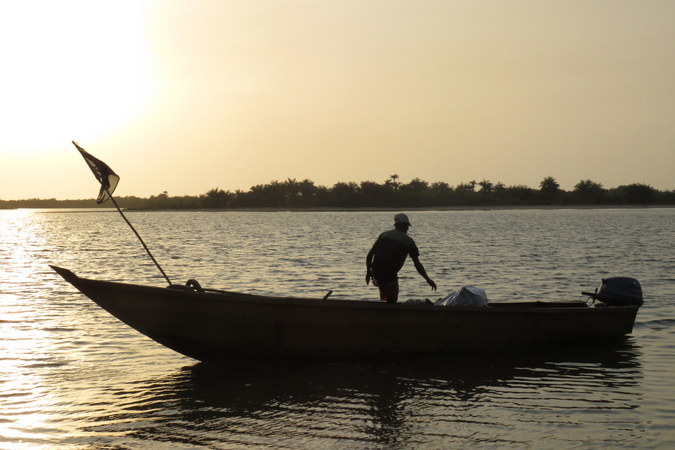
Village life
A thin layer of cloud builds up overnight, making it almost chill the next morning, and the woodwork of the boat is wet.
“Did it rain last night?” I ask Moses.
“No, it’s snow” he says, using the Krio term for dew. “The snow here is not like Freetown.” But then nothing is.
Moses points the boat’s bow in the direct of Sei’s contrasting snow-white sands. The waters have a mirror-like sheen to them. Simple huts with walls of plaited palm-frond matting and roofs of unplaited fronds cluster around the beach.
The island’s children gather around, in gentle competition to be the ones who take hold of my hands. They pull the skin from my arms as they stroke the hairs on them. Most of the scattered population of the islands have little contact with the outside world; I’m an exciting interlude into a normal island day. As an elder sister struggles to carry a heavy toddler towards me; he bursts into uncontrollable tears. At the centre of the village, teenagers are bunched around a transistor radio, their only constant connection with the world beyond their islands as if the president in distant Freetown is about to declare an end to all work. But rather than a presidential decree, it’s the midweek football.
“You like football? You should support Liverpool” I’m told. They look disparaging when I say I follow Crystal Palace, the south London side, instead.
Back in Yawri Bay I count thirty local fishing boats, bedecked with fluttering flags like bunting. The arched back of a dolphin cuts through the currents to one side of them. We greet each in turn with a broad wave of an arm as they cut a path perpendicular to our own. Despite their presence, Moses’ bad luck holds, and he’s forced to pull in his line empty-handed once more as my mobile phone kicks back into life.
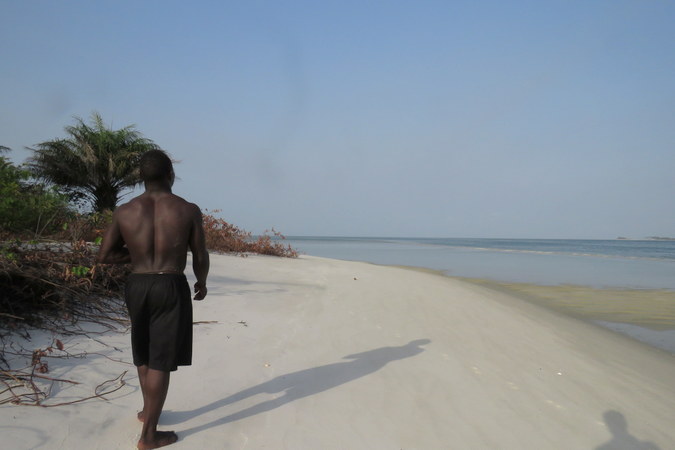
Ian visited the Turtle Islands with the team from Dalton’s Banana Guest House, based on Banana Island on the Freetown peninsula.
To comment on this story: Login (or sign up) to our app here - it's a troll-free safe place 🙂.![]()






